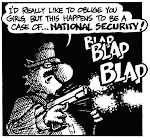Friday 26 September 2008
by: Murray Waas, The Atlantic

Sources say Alberto Gonzales now claims that President Bush personally directed him to John Ashcroft's hospital room in the infamous wiretap renewal incident. (Photo: Lawrence Jackson / The Associated Press)
In March 2004, White House Counsel Alberto Gonzales made a now-famous late-night visit to the hospital room of Attorney General John Ashcroft, seeking to get Ashcroft to sign a certification stating that the Bush administration's warrantless wiretapping program was legal. According to people familiar with statements recently made by Gonzales to federal investigators, Gonzales is now saying that George Bush personally directed him to make that hospital visit.
The hospital visit is already central to many contemporaneous historical accounts of the Bush presidency. At the time of the visit, Ashcroft had been in intensive care for six days, was heavily medicated, and was recovering from emergency surgery to remove his gall bladder. Deputy Attorney General James B. Comey has said that he believes that Gonzales and White House Chief of Staff Andrew Card, who accompanied Gonzales to Ashcroft's hospital room, were trying to take advantage of Ashcroft's grievously ill state-pressing him to sign the certification possibly without even comprehending what he was doing-and in the process authorize a government surveillance program which both Ashcroft and the Justice Department had concluded was of questionable legality.
Gonzales has also told Justice Department investigators that President Bush played a more central and active role than was previously known in devising a strategy to have Congress enable the continuation of the surveillance program when questions about its legality were raised by the Justice Department, as well as devising other ways to circumvent the Justice Department's legal concerns about the program, according to people who have read Gonzales's interviews with investigators. The White House declined to comment for this story. An attorney for Gonzales, George J. Terwilliger III, himself a former deputy attorney general, declined to comment as well.
Although this president is famously known for rarely becoming immersed in the details-even on the issues he cares the most about-Gonzales has painted a picture of Bush as being very much involved when it came to his administration's surveillance program.
In describing Bush as having pressed him to engage in some of the more controversial actions regarding the warrantless surveillance program, Gonzales and his legal team are apparently attempting to lessen his own legal jeopardy. The Justice Department's inspector general (IG) is investigating whether Gonzales lied to Congress when he was questioned under oath about the surveillance program. And the Justice Department's Office of Professional Responsibility (OPR) is separately investigating whether Gonzales and other Justice Department attorneys acted within the law in authorizing and overseeing the surveillance program. Neither the IG nor OPR can bring criminal charges, but if, during the course of their own investigations, they believe they have uncovered evidence of a possible crime, they can seek to make a criminal referral to those who can.
In portraying President Bush as directly involved in making some of the more controversial decisions about his administration's surveillance program, Gonzales may, intentionally or unintentionally, be drawing greater legal scrutiny to the actions of President Bush and other White House officials. And what began as investigations narrowly focused on Gonzales's conduct could easily morph into broader investigations leading into the White House, and possibly leading to the appointment of a special prosecutor.
Dan Richman, a former federal prosecutor in Manhattan and professor at Columbia Law School, told me that Gonzales appears to be attempting to walk the thin line of taking himself out of harm's way while at the same time protecting the president, a strategy that very well could work: "I think he is serving his own purposes and the White House's purposes," Richman says.
According to Richman, by invoking Bush's name and authority, Gonzales and his legal team are making it more difficult for investigators to seek a criminal investigation of his actions, or for other investigators to later bring criminal charges against him: "The clearer it is that Gonzales did what he did at the behest of the president of the United States, the safer that he [Gonzales] is legally," says Richman. At the same time, by saying that he is advising the president, Gonzales also makes it easier for those at the White House to claim executive privilege if they do indeed become embroiled in the probe.
Moreover, according to one senior Justice Department official, Gonzales, his legal team, and the White House also know that Justice's IG and OPR are unlikely to press senior White House officials, let alone the president, to answer their questions.
But this legal strategy could also backfire.
One scenario feared by the White House is that the IG or OPR could send a public report to Congress concluding that Gonzales or some other official may have committed a crime. At a minimum, that would make the conduct of Gonzales, or of any other official deemed to be under suspicion, the subject of a criminal investigation.
If the report also raised unanswered questions about possible misconduct by other senior administration officials, or even the president, that could lead to the appointment of a special prosecutor. Some consider this unlikely; Attorney General Mike Mukasey has said that he is not an advocate of special prosecutors, and his critics in Congress have said that Mukasey tends to use his position for the political benefit of the White House. But in the hands of congressional Democrats, a public report accusing Gonzales and other administration officials of misconduct could make it difficult for Mukasey to resist their calls for the appointment of a special prosecutor.
Inside the White House, this is what is called the "nightmare scenario." White House Counsel Fred Fielding, who served in the Nixon White House during Watergate and as a White House counsel during the Reagan administration, has told others in the White House that although he does not consider this a likelihood, it should not be ruled out, and Bush and his staff should be ready for such a contingency. In addition to the Justice Department's IG and OPR investigations regarding the surveillance program, Gonzales is also under investigation by the IG as to whether he lied to Congress about the politicized firings of nine U.S. attorneys. Fielding has told White House colleagues that there is an outside possibility that a special prosecutor could be appointed to conduct a broader investigation.
In the meantime, however, it will be increasingly difficult for the president to claim he was detached from the major decisions regarding his surveillance program. One fiction that has been set aside is that the regrettable incident in Ashcroft's hospital room was the work of overzealous or insensitive staff.
The narrative of a detached Bush delegating to his staff and to his vice president continues to be the predominant one. Gonzales and Vice President Cheney have been only too happy to serve as lightning rods for criticism of the administration, drawing fire away from many of President Bush's most controversial decisions on national-security policy.
Washington Post reporter Barton Gellman's recently published book on Cheney, The Angler, once again implies that it was Cheney who was running the show. An excerpt published in The Washington Post about the president's role in pressing for the surveillance program was headlined "Cheney Shielded Bush From Crisis." The article was also summarized as follows on the newspaper's Web site: "President was nowhere in the picture as Cheney fought to keep surveillance program on track."
But seemingly contrary to the book's broader conclusions was a story corroborating Gonzales's account to investigators that Bush ordered him and Card to go visit Ashcroft in the hospital. Indeed, if Gellman is correct, Gonzales and Card would never have been admitted to Ashcroft's hospital room without the president's intercession in the first place. Gellman wrote:
The phone started ringing in the makeshift command center next to John Ashcroft's hospital room. Janet Ashcroft had been at her husband's side for six days. He was in intensive care, sedated, recovering from emergency surgery to remove his gallbladder. Mrs. Ashcroft's orders were unequivocal: no calls, from anyone, for any reason. According to two people who saw the FBI's handwritten logs, the White House operator-on behalf of Gonzales or Card, it was unclear which-asked to be connected to the attorney general. The hospital switchboard, following orders, declined.
That evening, the FBI logged a call from the president of the United States. No one had the nerve to refuse him. The phone rang at Ashcroft's bedside. Bush told his ailing cabinet chief that Alberto Gonzales and Andy Card were on their way.
Tipped off by Ashcroft's chief of staff, Acting Attorney General Comey and other Justice Department officials raced to the hospital so they would be there when Gonzales and Card arrived. It will never be known whether Ashcroft would have been competent to understand what they were telling him and whether they would have persuaded him to sign.
Had he gone ahead and done so, he would be have been signing a document facilitating a program that he and his top aides had only recently concluded was of questionable legality.
As Gonzales and Ashcroft made their way to the George Washington University Medical Center, where Ashcroft was recovering from surgery, an upset Mrs. Ashcroft called her husband's chief of staff to tell him that Gonzales and Card were on their way to the hospital. He in turn called Comey.
Comey's account of what transpired next is now well known. Comey, FBI Director Robert Mueller, and Jack Goldsmith, head of the Justice Department's Office of Legal Counsel, whose office had recently written a legal opinion concluding that the surveillance program was of questionable legality, have all testified about what transpired just before and during the showdown in Aschcroft's hospital room. But it bears some repeating, if only to show what we now know President Bush set in motion.
Comey was on his way home the evening of March 10, 2004, when he received the call. He ordered his security detail to get him to the hospital immediately.
Comey later told the Senate Judiciary Committee: "I was concerned that, given how ill I knew the attorney general was, that there might be an effort to ask him to overrule me when he was in no condition to do that."
Careening down Constitution Avenue at high speed and with sirens blaring, Comey arrived only minutes before Gonzales and Card did. Similarly alerted, Goldsmith had also raced to the hospital and run up the steps to arrive, out of breath, at Ashcroft's bedside.
On the way, Comey had frantically called FBI Director Robert Mueller. Mueller was so concerned about what Gonzales and Card were attempting to do, according to Comey, that he instructed FBI agents who constituted Ashcroft's and Comey's security details that Comey was not "to be removed from the room under any circumstance."
Within minutes after Comey and Goldsmith reached Ashcroft's bedside, Gonzales and Card also arrived. Comey would later recall to Congress that Gonzales was "carrying an envelope" with him. The envelope contained the certification that President Bush so badly wanted him to sign.
"I was angry," Comey testified. "I thought I just witnessed an effort to take advantage of a very sick man, who did not have the powers of the attorney general because they had been transferred to me."
Gonzales, in an attempt to persuade Ashcroft to sign the certification, simply misled Ashcroft. Gonzales told Ashcroft he had met earlier that day with congressional leaders who, he claimed, supported the continuation of the program without Department of Justice approval, and were determined to find a legislative remedy that would address the legal concerns of Comey and others. Several of the legislative leaders who had been at that meeting with Gonzales and Vice President Cheney say that Gonzales's account of what transpired was simply not true.
In response to Gonzales's and Card's gambits, Ashcroft, according to Comey, "stunned me ... lifted his head off the pillow," and then told Gonzales and Card, "I'm not the attorney general." Mustering all the energy he had left, he pointed toward Comey and resolutely said, "There is the attorney general."
Even in the face of Ashcroft's refusal to certify the program as being within the law, President Bush initially reauthorized the surveillance program on his own. In The Angler, Barton Gellman suggests that this move "may have been the nearest thing to a claim of unlimited power ever made by an American president, all the more radical for having been issued in secret. Not only would the will of Congress be flouted, but if the White House had its way, Congress would never know."
Learning of the reauthorization, Ashcroft, Comey, and more than a dozen officials at the highest levels of government became concerned that if the surveillance program was allowed to continue on as it had been, the government could be engaging in an illegal activity at the direction of the president, and they quietly spoke of resigning en masse.
The mass resignation of so many senior officials of the government would have been all but unprecedented in modern American political history.
One former Justice Department official personally involved in the events said that the only historical precedent would have been the Saturday Night Massacre, when Attorney General Elliot Richardson resigned rather than carry out an order from President Nixon to fire the Watergate special prosecutor, Archibald Cox. With Richardson out of the way, Nixon ordered the new acting attorney general, William Ruckelshaus, to fire Cox; Ruckelshaus also refused and resigned as well. The next in line for succession as acting attorney general was the solicitor general, Robert Bork, who finally fired Cox and ordered the FBI to seal and seize Cox's office.
The former Justice Department official says that the Saturday Night Massacre would have "been nothing compared to what almost came to be ... I mean, it would have been poof! and the attorney general would have been gone. The deputy attorney general would have been gone. Goldsmith-he would have been gone. The FBI director would have resigned."
If all those men had resigned, top aides to each of them would have resigned as well. Ashcroft's chief of staff and two deputy chiefs of staff said they would go with their boss. Comey's top aides would have resigned with him. The general counsels of the CIA and FBI said they were going to resign as well.
Adding to this constitutional spectacle would have been the fact that the administration's warrantless surveillance program was considered one of the most closely held national-security secrets in government at the time. There would have been no immediate explanation of why a portion of the government just up and resigned at once.
Ultimately, confronted with the possible resignations of his own top aides, Bush backed down. The president agreed to address the concerns of the Justice Department and to make significant changes in the program so that it would be conducted within the law. But the president did not do so without first defiantly telling Comey, "I decide what the law is for the executive branch."
Bush's change of heart apparently had little to do with the rule of law, but rather more to do with political pragmatism and his fear that the entire affair might become public.
Before Gonzales and Card met with Ashcroft in the hospital, Gonzales and Cheney met with congressional leaders so as to enlist their possible aid in finding a legislative means for continuing the eavesdropping program if Comey and others continued to disagree about its legality. Bush personally instructed Gonzales to write notes of what was said at the meeting, according to a report released on September 2, 2008, by the Justice Department's inspector general. The disclosure came because the IG was investigating whether Gonzales had mishandled classified information while attorney general.
A single sentence in the report says: "Gonzales told the OIG [Office of Inspector General] that President Bush directed him to memorialize the March 10, 2004 meeting."
Among those present at the meeting besides Gonzales and Cheney, according to the IG report, were National Security Agency Director Michael Hayden, the speaker of the House of Representatives, the House minority leader, the Senate majority and minority leaders, and the chairmen and vice chairmen of the congressional intelligence committees.
Regarding the notes that Gonzales made about the meeting, the IG report went on to say:
Gonzales stated that he drafted notes about the meeting in a spiral notebook in his White House Counsel's Office within a few days of the meeting, probably on the weekend immediately following the meeting. Gonzales stated that he wrote the notes in a single sitting except for one line, which he told us he wrote within the next day.
A congressional source familiar with the meeting said in an interview that he believed it was significant that Bush personally directed Gonzales to write notes as to what occurred at the meeting. Ordinarily members of Congress don't take notes at briefings concerning such highly classified issues. Very likely, Gonzales's notes are the only ones that exist. [The Justice Department is investigating whether former Attorney General Alberto Gonzales created a set of fictitious notes so that President Bush would have a rationale for reauthorizing his warrantless eavesdropping program. For that story click here.]
The September 2 report by the IG narrowly focused on the question of whether Gonzales "mishandled classified documents" during his tenure as attorney general. The report concluded that Gonzales "violated Department security requirements and procedures" in handling 18 documents, classified as Top Secret or higher. Several were marked as SCI, or "sensitive compartmented information," a category for the most highly classified records in government.
Among the most sensitive of those documents mishandled were the notes that Gonzales made of his March 10, 2004, meeting with congressional leaders.
It is unclear, based on what Gonzales wrote in his notes, what exactly he was told by the congressional leaders during the White House's meeting with them.
But on July 24, 2007, when questioned before the Senate Judiciary Committee about the events of March 10, 2004, Gonzales testified that the members of Congress he met with that day had told him that "despite the recommendation of the deputy attorney general," the government should still "go forward with very important intelligence activities."
Several of the members of Congress who were at the March 10 meeting-House Minority Leader Nancy Pelosi and Senate Minority Leader Tom Daschle among them-have said they said no such thing.
Shortly before Gonzales resigned from office in August 2007, the Justice Department's inspector general, Glenn A. Fine, wrote to inform Congress that he was investigating whether statements made by Gonzales under oath during congressional testimony were "intentionally false, misleading, or inappropriate."
Among the statements that Fine is apparently investigating is one in which Gonzales claimed that the congressional leaders had wanted him to move forward with the program despite Comey's refusal to certify it as legal.
Gonzales is also in legal jeopardy for having earlier told the Senate Judiciary Committee that there had never been any "serious disagreement" about the legality of the administration's surveillance program: "There has not been any serious disagreement about the program the president has confirmed," he testified in February 2006.
At the time Gonzales made that statement, the public had no idea about his late-night hospital-room visit with John Ashcroft-and he apparently had no expectation that it would ever come to light.
In one additional instance, President Bush was the person responsible for a controversial decision regarding his surveillance program.
This involved an effort to prevent his very own Justice Department from investigating the surveillance program in the first place. During 2006 and 2007, I wrote a series of stories for National Journal about how the Justice Department's Office of Professional Responsibility wanted to investigate the administration's surveillance program, but was unable to because its investigators were being denied security clearances to do their work. (Those articles can be found here, here, and here.) Over time, it was revealed that Gonzales had denied those security clearances, and later that Bush himself had made the decision disallowing them.
The story that I wrote for the March 15, 2007, edition of National Journal began as follows:
Shortly before Attorney General Alberto Gonzales advised President Bush last year on whether to shut down a Justice Department inquiry regarding the administration's warrantless domestic eavesdropping program, Gonzales learned that his own conduct would likely be a focus of the investigation, according to government records and interviews.
Bush personally intervened to sideline the Justice Department probe in April 2006 by taking the unusual step of denying investigators the security clearances necessary for their work.
It is unclear whether the president knew at the time of his decision that the Justice inquiry-to be conducted by the department's internal ethics watchdog, the Office of Professional Responsibility-would almost certainly examine the conduct of his attorney general.
At the time the story was published, Gonzales was fighting for his political life. Republicans in Congress had joined Democrats in sharply criticizing Gonzales for his role in the firings of nine U.S. attorneys. A whole new controversy might make his resignation from office imminent.
Gonzales immediately fought back. On March 22, 2007, a senior Justice Department official wrote Congress on his behalf, saying not only that it was President Bush who had made the decision to deny security clearances to the OPR investigators, but also that Gonzales had advised the president that the investigation should be allowed to move forward, and that Bush had overruled that advice.
A senior Justice Department official told me that the letter was approved in advance by the White House: "It was decided that in this instance the attorney general could no longer take the heat for the president ... This time the president was going to take responsibility and deflect criticism for [his attorney general] instead of the other way around."
At the time, it appeared that the president had halted the Justice Department's probe in order to protect his attorney general, whose conduct was going to be a central focus for investigators. But as more information continues to come to light, the president's denial of the security clearances raises an important question: Were the president's actions designed to protect his attorney general-or himself?
--------
Murray Waas is a writer in Washington, DC.





























